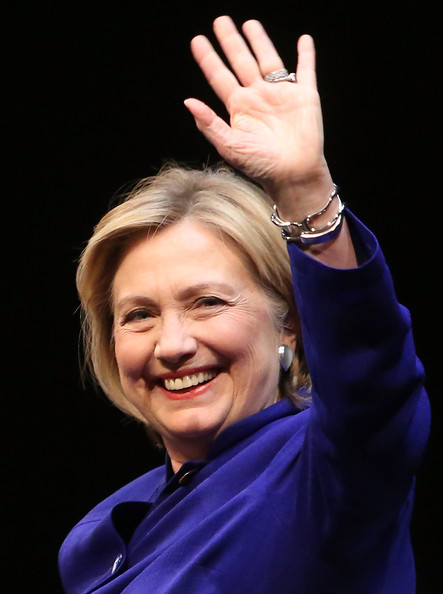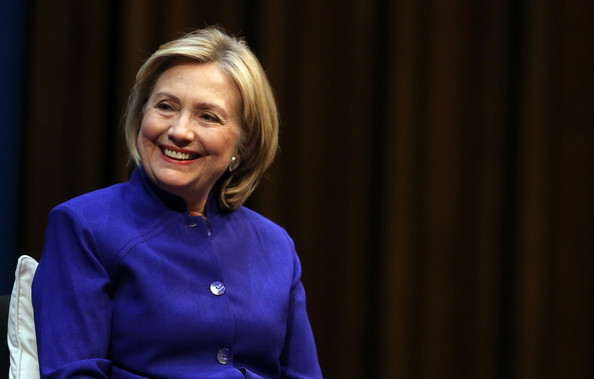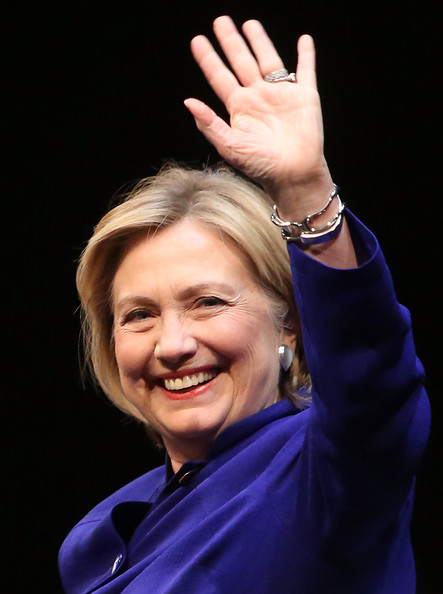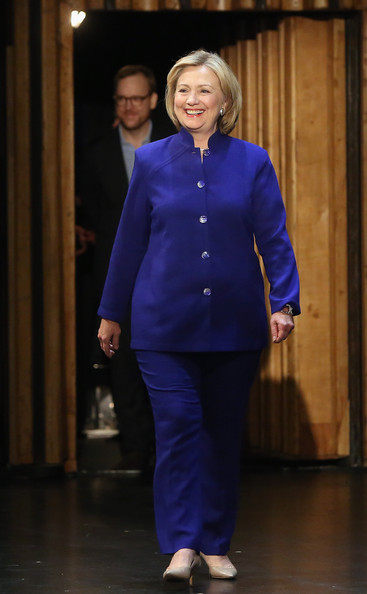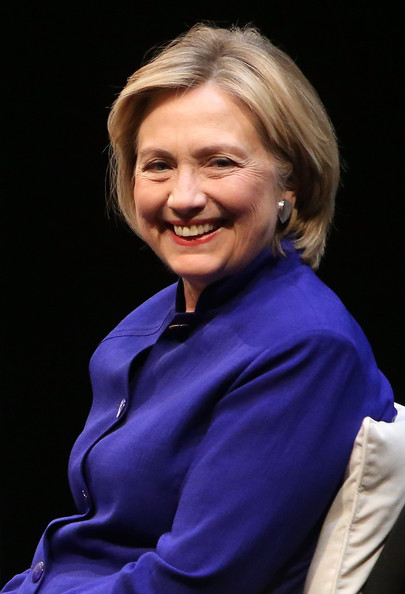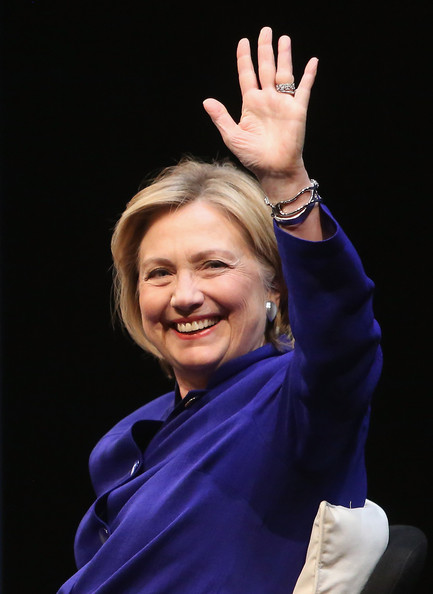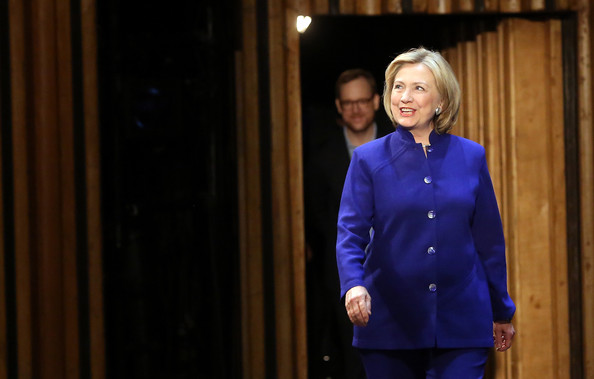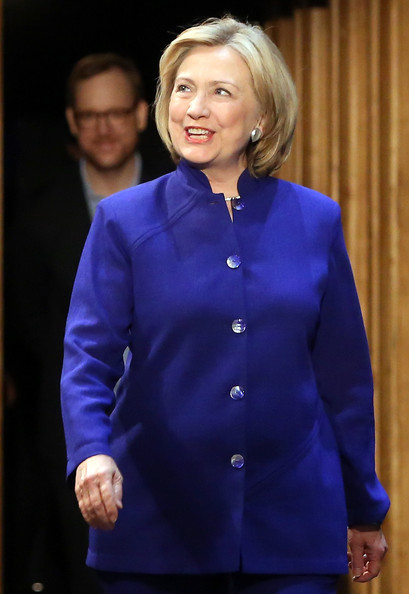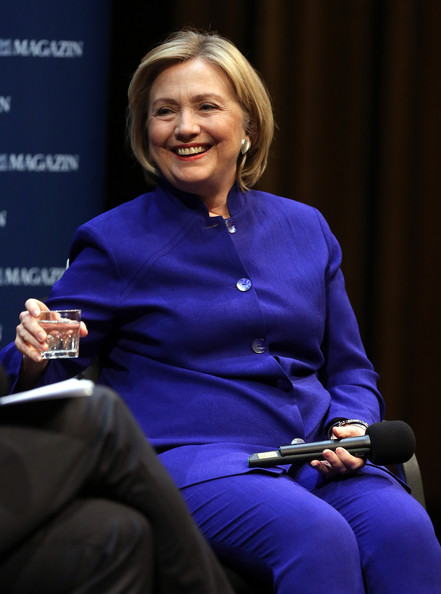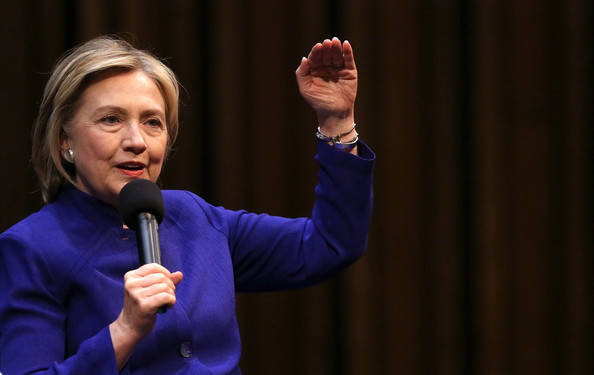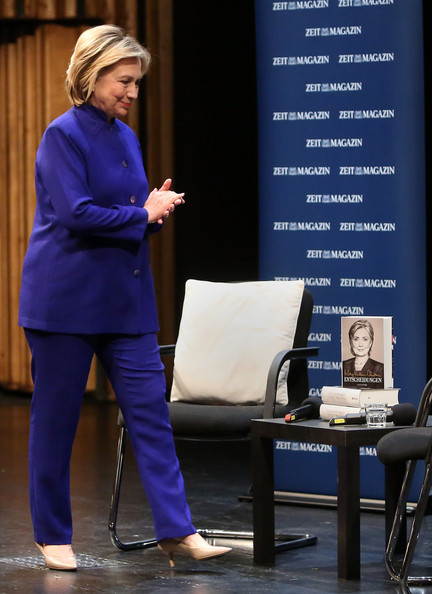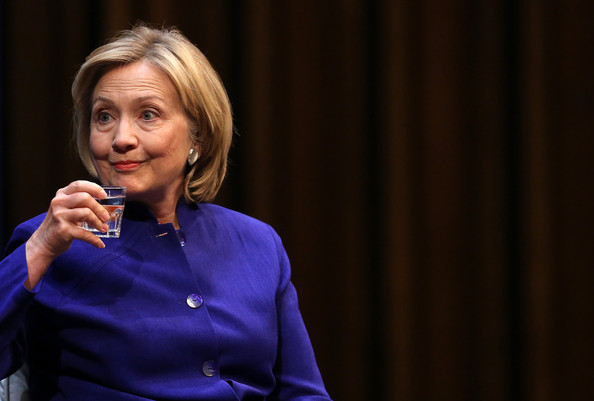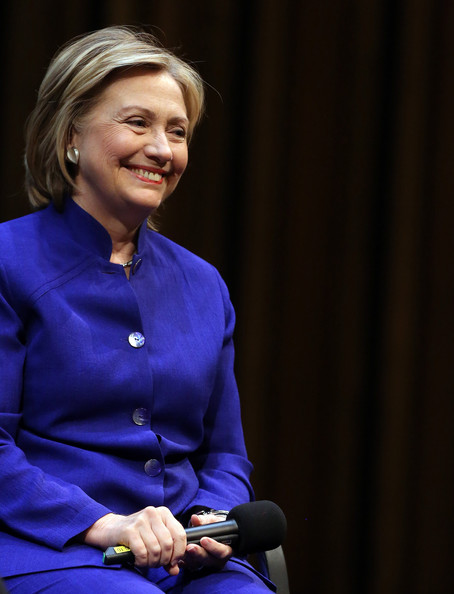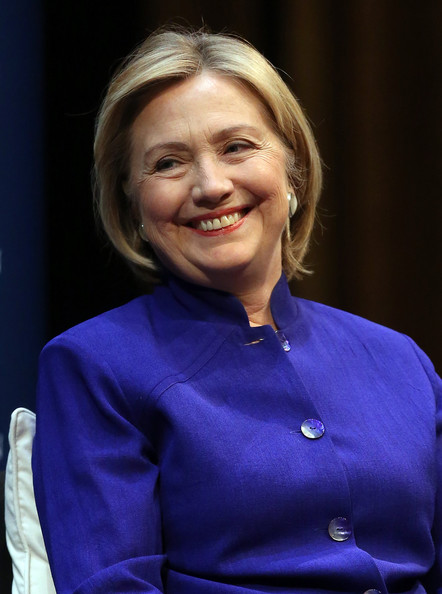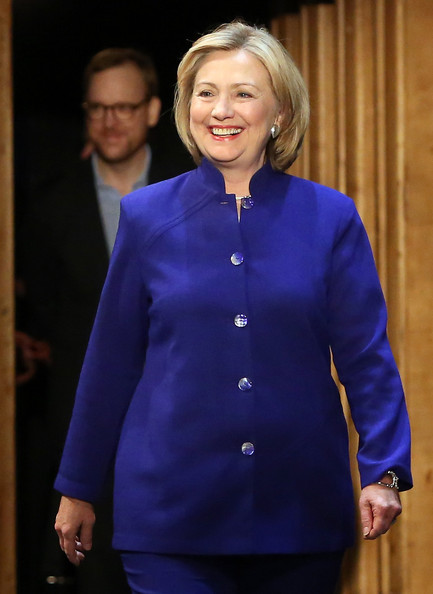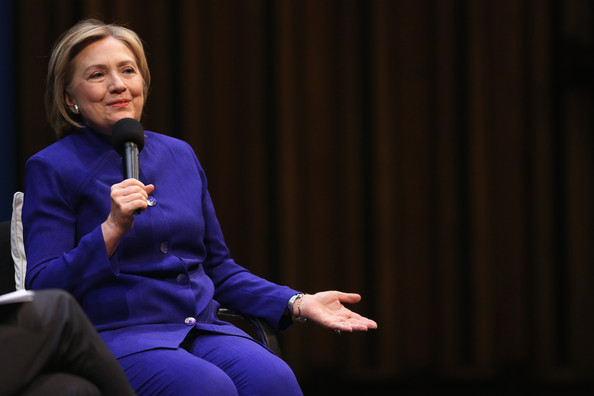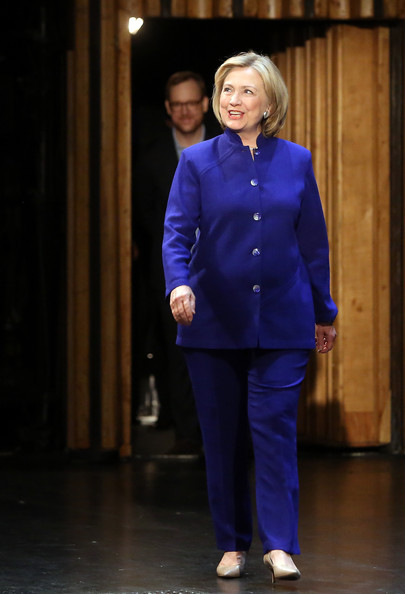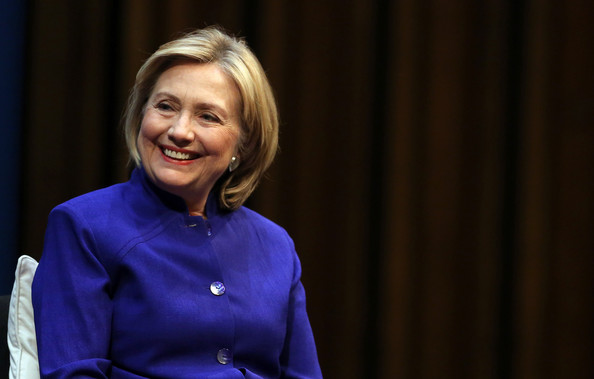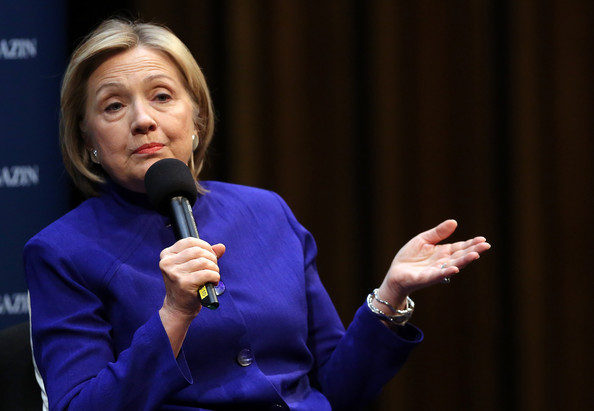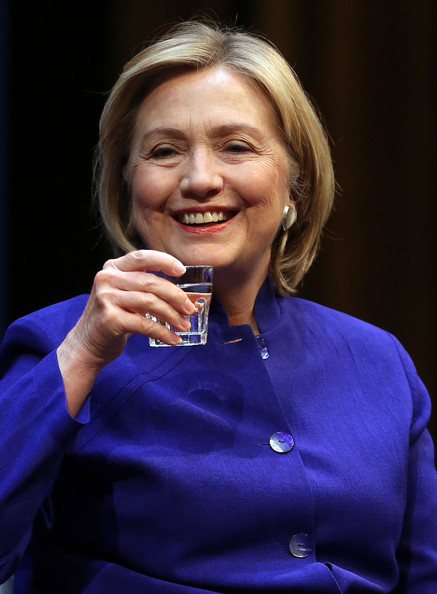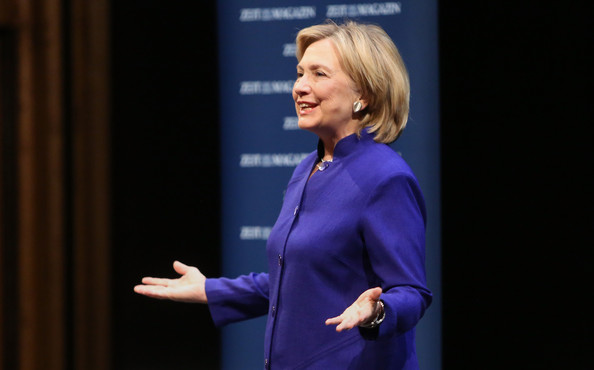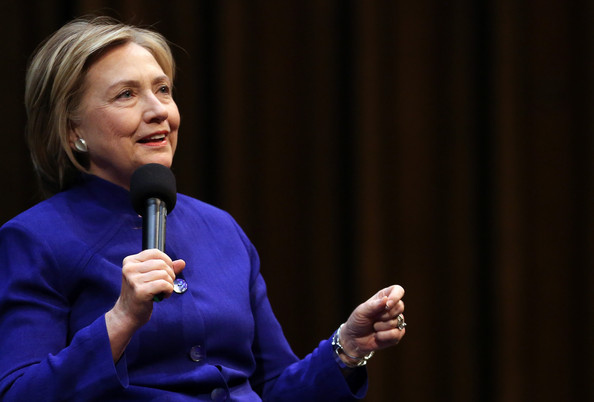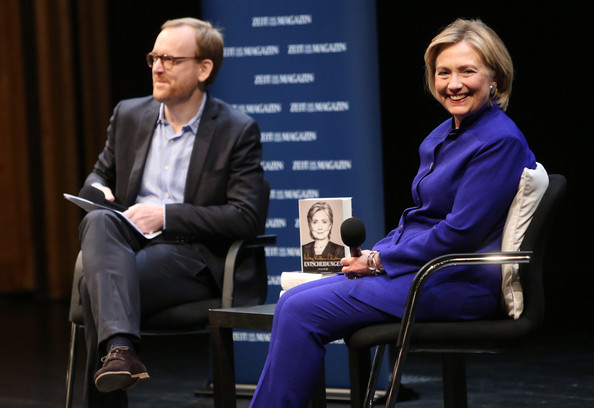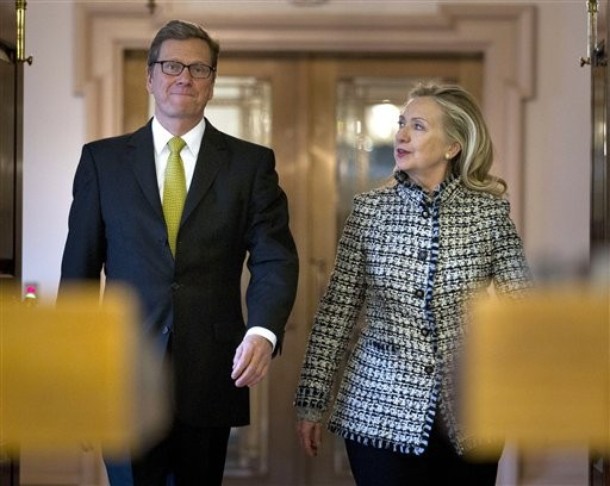World leaders bid farewell to 'patriot' Helmut Kohl
The former German chancellor was remembered as both a German and European patriot, who paved the way to a united Europe.UK, Saturday 01 July 2017
Past and present world leaders have bid farewell to Helmut Kohl, the German chancellor who helped unite Europe.Mr Kohl, who died aged 87 on 16 June, was remembered as both a German and European patriot, who deserved "a place of honour in the European pantheon".
The former chancellor becomes the first person to be honoured with an official memorial event by the European Union in the French city of Strasbourg.
SNIP
Among the many dignitaries present at the memorial was former US president Bill Clinton, who thanked Kohl for giving "us the chance to be involved in something bigger than ourselves".
"Bigger than our terms of office, bigger than our fleeting careers," he said.
"Because all of us, sooner or later, will be in a coffin like that," he added.
"And the only gift we can leave behind, is a better future for our children, and the freedom to do their own choices. Including their own mistakes."
The 70-year-old politician said his wife, Hillary Clinton, said he loved Mr Kohl "because he was the only person with a bigger appetite for food than I have".
"The 20th century in Europe really began on his watch," Mr Clinton added.
Read more and see video >>>>
Sunday, July 2, 2017
Bill Clinton Attends the Memorial for Helmut Kohl in Strasbourg
Sunday, July 6, 2014
Hillary Clinton's Book Tour Watch: Berlin
Saturday, January 28, 2012
Secretary Clinton to Travel to Germany and Bulgaria
Secretary Clinton to Travel to Germany and Bulgaria
Press Statement
Victoria Nuland
Department Spokesperson, Office of the SpokespersonWashington, DCJanuary 27, 2012
On February 3-5, Secretary of State Hillary Rodham Clinton will travel to Germany and Bulgaria. In Munich, Germany, Secretary Clinton will participate in the 48th Munich Security Conference. This annual event brings together global leaders to discuss common security challenges. In her address to the Conference, the Secretary will reaffirm the fundamental importance of the transatlantic relationship and Europe’s role as an essential partner in addressing global security challenges.
While in Munich the Secretary will also hold bilateral meetings with her European and other counterparts.
The Secretary will travel to Sofia, Bulgaria, February 5, to meet with senior Bulgarian officials and discuss a range of issues, including democratic transitions in the Middle East, our ongoing support for Afghanistan, energy security and our bilateral cooperation in international law enforcement.
Saturday, January 21, 2012
Secretary Clinton with German FM Westerwelle
Remarks With German Foreign Minister Guido Westerwelle
RemarksHillary Rodham Clinton
Secretary of StateWashington, DCJanuary 20, 2012
SECRETARY CLINTON: Good afternoon, everyone. It is a great pleasure for me to welcome the foreign minister back once again to the State Department. Germany and the United States are steadfast allies and close partners on a range of issues. We’re also good friends, and I was happy to see the minister shortly after he hit the 50-year mark, which is a very important milestone. FOREIGN MINISTER WESTERWELLE: Thank you so much, and thank you for the birthday cake. (Laughter.)
SECRETARY CLINTON: I think – are we going to do consecutive translation on both sides or just on the German side?
FOREIGN MINISTER WESTERWELLE: No. We will speak English.
SECRETARY CLINTON: Okay. You’ll speak English. Okay. Then we’ll not do it unless we have a question that calls for it.
Guido and I discussed Afghanistan. We obviously are very committed to the path forward for a stable, peaceful Afghanistan. We are deeply regretting the bad news about the four French soldiers killed earlier today in the second attack on French soldiers this month. That follows the deaths yesterday of six U.S. Marines in a helicopter crash. So let me express, on behalf of all Americans, are deepest condolences to the families of both those French and American soldiers. We know what a personal loss that is and how important it is we work toward our goal of security and long-term stability.
I want to thank Guido once again for hosting the Bonn conference on Afghanistan last month and the continuing bravery of German soldiers who serve with such distinction as the third largest national contingent in our NATO-ISAF forces.
We’re looking forward to our work in May in Chicago at the NATO summit, where we will advance several NATO priorities. Let me say clearly the United States is fully committed to maintaining a force posture in Europe that meets our enduring commitment to European security and our collective defense obligations to our NATO allies. We are grateful to Germany for hosting the U.S. military for many years, and we will be maintaining a close relationship going forward. We recognize that the transatlantic partnership is absolutely indispensable to our own security and well-being.
We are also focused on economic security, and we both recognize and appreciate greatly Germany’s leadership role in resolving the debt crisis facing Europe. I can only imagine how challenging this is. And as I conveyed to the minister, the United States stands in support of Germany as it leads the way for all of the Eurozone countries to regain their economic footing and to implement measures that will restore sustainable and balanced growth.
We discussed at some length our nation’s shared concerns regarding Iran and the steps it has taken toward furthering its nuclear weapons ambitions. We are both firmly committed to the dual-track approach, pressure to bring about meaningful engagement by Iran on its program, and we are closely coordinating as we implement sanctions.
We talked about so many things. We talked about North Africa, Egypt, Syria, the Middle East, and so much more. So as always, we have a very comprehensive agenda to cover, and I appreciate your being here for us to continue the conversation.
FOREIGN MINISTER WESTERWELLE: Thank you so much, Madam Secretary Hillary. Ladies and gentlemen, first of all, I would like to express my gratitude for the hospitality for the warm welcome here, and in this specific and special case also for the wonderful and delicious birthday cake we just had a few minutes before. Don’t be jealous, it was really delicious. (Laughter.)
And I would like to say that this is, of course, not only an expression of our close collaboration, it is also an expression of our wonderful and very personal relationship. The United States is our most important partner and ally behind Europe. Close cooperation across the Atlantic is essential in times of global changes and enormous political challenges, so we discussed, of course, the deeply worrying situation in Syria. The regime of President Assad must be stopped urgently. We support the efforts by the Arab League to solve the crisis, and we agree that the United Nations Security Council must take a clear position to condemn the violence by the Syrian regime.
On Iran, I have informed my colleague, Madam Secretary, about the discussions in the European Union on new sanctions. The government in Tehran keeps violating its international obligations on the transparency of its nuclear program. We have no choice but to pass tough new sanctions that address the financial sources of the nuclear program. One this is clear, the door for serious dialogue remains open, but the option of nuclear weapons in Iran is not acceptable to both of us.
And I want to repeat what I said to my colleague and friend in the last hour before. I think it is important for all of us to see that a nuclear option is not acceptable of Iran. And this is not only our raison d’etre, to protect Israel. It is also a question of the balance in the region, and it’s also unacceptable if we look to the situation and the nonproliferation necessity worldwide. So I think this is a serious situation, but we will stand united to give a common and clear and, unfortunately, tough answer, because a nuclear option for Iran is not acceptable – not for the region, not for the world.
We also discussed the situation in the transformation countries of the Arab Spring. There are enormous political and economic challenges, and we have to support a successful transformation. I explained our transformation partnership program, which we designed in Germany and what was introduced in our European policy, and I think it is successful. But we all know we have to see and we have to differentiate from country to country, and I think this is necessary that we do not think one answer fits all, one size fits all. I think it is necessary to give specified answers and differentiated answers.
We also discussed the preparation of the NATO summit in Chicago in May. Of course, this is important for us. We both want a successful NATO meeting in Chicago, and we’re looking forward to this. Once again, we are looking forward for all the hospitality of the Government of the United States of America. And of course we want this summit to become a success and we will work hard for this.
We also discussed – and this is what I wanted to underline because it is important not only for your discussions, but it’s a crucial time for us in Europe, of course, like you all know – we also discussed the debt crisis in Europe. I know that some in the United States paint a dark picture of an old continent unable to solve its problems. First of all, allow me in an ironical remark. We finished socialism with the support of the United States of America 20 years ago, and we know that we have to show solidarity. This is our desire and our destiny. As Germans, we know that Europe is not only the answer to the darkest chapter of our own history; it is also our life insurance in times of globalization. And I think it is crystal clear that Germany is committed to Europe and to the Eurozone, and we will show solidarity on the one hand, but on the other hand we also will ask for structural reforms because both is the answer to this present crisis.
Well, thank you so much for the hospitality and I, unfortunately, also want to say a few words to this latest attacks and the killings of our soldiers and our friends in Afghanistan. I am shocked by the tragic death of the French and the American soldiers in Afghanistan. I would like to express my sympathy and my deepest condolences in the name of the Federal Republic of Germany to all the families and to the relatives. But also it’s clear tragic setbacks such as this must not stop our engagement for peace and reconciliation in Afghanistan.
Thank you, Hillary. Thank you so much
SECRETARY CLINTON: Thank you for your --
FOREIGN MINISTER WESTERWELLE: -- for the time and the hospitality.
MS. NULAND: We’ll take two today, one from each side. First one is from Kirit Ridia, ABC.
QUESTION: Hi, Madam Secretary, Mr. Minister. A question on Iran, if I may. Iran in recent days has expressed some willingness to return to talks on its nuclear program. Just today, Lady Ashton released a letter she sent to the Iranians in October in which she calls on them to take some concrete steps for confidence building. First question would be: What exactly are those steps that you’re looking for the Iranians to take? And second, do you take them at their word this time that they’re willing to fully engage?
And if I may Madam Secretary, in our way of asking two questions – (laughter) – you’ve made a decision not to testify on the Keystone XL pipeline next week. Can you explain why you don’t want to do that? Thank you.
SECRETARY CLINTON: Well Kirit, first let me say that we’re going to miss you. I understand this may be the last time I get two, three, or four questions from you. (Laughter.) But we wish you well as I think you head off to Moscow, which will be an exciting assignment, from all indications.
With respect to Iran, first let me say that we have a very strong partnership with the EU, and we expect to see the EU taking some additional steps to keep the pressure on Iran in the coming days. And I believe that we’re making it clear to Iran, as the minister said, that its pursuit of nuclear weapons and its needless provocations such as the threats regarding the Straits of Hormuz, place it on a dangerous path. Iran does have a choice to make. It can come back to the table, as we have consistently made clear to them, and address the nuclear program concerns that the international community rightly has or face increasing pressure and isolation.
I want to underscore we do not seek conflict. We strongly believe the people of Iran deserve a better future. They can have that future. The country can be reintegrated into the global community, able to share in the benefits when their government definitively turns away from pursuing nuclear weapons.
Last October, on behalf of the E-3+3 member nations, of which both Germany and the United States are two, High Representative Ashton did send the Iranians a letter saying that we are open to negotiations if Iran is serious about addressing the nuclear program without preconditions. We stand by that letter. The EU did make it public earlier today, and we await Iran’s response. And I think it’s been very important that the EU has kept this open channel. And we all are seeking clarity about the meaning behind Iran’s public statements that they are willing to engage, but we have to see a seriousness and sincerity of purpose coming from them.
And with respect to what we expect of them, I think we’ve made the letter public. They know we want to see them coming to the table to seriously engage about the future of a program that is prohibited under their obligations pursuant to the NPT and in light of Security Council resolutions. So we will await their response.
With respect to the Keystone XL Pipeline, as you know, on Wednesday, the Department of State recommended and President Obama agreed that the presidential permit for the proposed pipeline should be denied. That decision was based on the fact that the State Department did not have sufficient time to assess whether the project was in the national interest as a result of the limited timeframe set forth by Congress. And as the President said yesterday, this announcement is not a judgment on the merits of the pipeline, but the arbitrary nature of a deadline that prevented the State Department from gathering the information necessary to approve the project or to make other decisions with respect to it and protect the American people.
The Department’s denial of the permit application does not preclude any subsequent permit application or applications for similar projects, and we are following our normal procedures and actually sending the official that actually knows something about this issue in great depth and has been leading our efforts, Assistant Secretary for Oceans and International Environmental and Scientific Affairs Kerri-Ann Jones, to the Congress to testify.
QUESTION: (Inaudible) on Iran again. You didn’t say what those specific steps you wanted to see were from Iran. Can you tell us what those are?
SECRETARY CLINTON: Well, we won’t know until we know whether they’re serious about engaging with us.
QUESTION: You don’t have anything in mind already?
SECRETARY CLINTON: Oh, yeah. We do. They have to give up their nuclear weapons program. (Laughter.) They have to be – they have to be willing to come to the table with a plan to do that.
QUESTION: The confidence-building measures were specifically referenced in the letter --
SECRETARY CLINTON: Well, confidence-building measures would – I’m not going to go into any more detail. I appreciate your efforts to get me to do so. But I think what’s important is that confidence will start with their conveying a seriousness of purpose to engage with us and our partners in the E-3+3 process. That would build confidence, and then the additional steps will await the actual resumption of negotiations.
FOREIGN MINISTER WESTERWELLE: If I may add just a few words to this, because I agree to this answer a hundred percent. But I just want to explain with my words for the German Government and, of course, as a representative of the European Union here. This letter is important because it underscored and underlines our dual-track strategy. On the one hand, it is necessary to show the Iranian Government that we are united and that we do not accept any option for nuclear weapons in the hands of the Iranian Government. That’s the one point. But on the other hand, second, it is also necessary to show that we are ready for dialogue, but we are ready for serious dialogue and substantial talks. Just to meet for show, that this meeting would be misused for propaganda, is not what we want to do. And therefore, I think this letter of Cathy Ashton is exactly expressing what our strategy is not only in Europe, together.
MS. NULAND: Last question. Hanni Husch of ARD.
QUESTION: Thank you, Madam Secretary, Herr Minister. Secretary, what exactly does the American Government expect from the German Government in solving the European debt crisis? Mr. Westerwelle made it perfect clear today that printing more money is not the answer.
And allow me, out of fairness, a second question. (Laughter.) A follow-up on –
FOREIGN MINISTER WESTERWELLE: This is the same (inaudible). (Laughter.)
QUESTION: A follow-up on Afghanistan. Mr. Sarkozy is considering the withdrawal of his troops. Is that the right answer?
SECRETARY CLINTON: With respect to the second question, I am in great sympathy with what happened to the French soldiers. It was terrible, and I can certainly appreciate the strong feelings that are being expressed.
We are in close contact with our French colleagues, and we have no reason to believe that France will do anything other than continue to be part of the very carefully considered transition process as we look at our exit, as previously agreed upon in Lisbon.
I think with respect to the Eurozone debt crisis, look, it’s not going to surprise you to hear me say that the United States cares deeply about what happens with this crisis. We have a great stake in the health and vitality of the European economic markets. European growth is essential for our growth. It’s essential for global growth. And we are – we know from our own experience that moving from crisis to recovery depends on rebuilding confidence and getting the economy to start moving again, producing jobs, producing growth. And Germany has been at the forefront of shaping the strategies to move Europe forward.
And as the minister said, there’s a lot of hard work ahead. We’re not going to stand over here on the other side of the Atlantic and second-guess the tough questions that you have to answer in Europe. But we think that our European partners, led by Germany, have laid a solid foundation on which to build a recovery. I know President Obama and Chancellor Merkel speak often about this. I know that the minister met with Secretary Geithner earlier today. So we are encouraging German decision making, German confidence building, German leadership, because it’s in the interests not only of Europe but of the United States as well.
FOREIGN MINISTER WESTERWELLE: Please allow me some words especially, of course, to the American journalists here, because I think for me it is very crucial and it’s very important that you understand our point of view. We think a debt crisis cannot be solved and cannot be answered by making it easier to take up new debts. So we think it’s necessary that we have structural reforms. So for us, it’s always a combination, solidarity, and Germany showed a lot of solidarity. We put on the table for solidarity in the European Union 200 billion Euro. If I would compare this to the economy and to the size of the economy in the United States of America, this would be $1 trillion. So we have to compare the sizes of our economy and we have to compare, of course, the size of our countries.
So I think this underlines it and make it crystal clear that Germany knows their own responsibility, and all these programs are supported by a majority in the German Bundestag of all party lines around about 70 or 80 percent. So I think this is a clear signal.
But on the other hand, please understand us. If we just put money into the window, if we just put money on the table and we wouldn’t ask for structural reforms, we wouldn’t solve the cause of crisis. So structural reforms which increases the competitiveness in the countries in the European Union are essential. And I mean, we do not ask for anything more as Germany, as Germans, than what we delivered in the last 10 years by our own structural reforms. And this is the reason, together with the programs of the last two years, why Germany is so, with all modesty, successful in the European Union. So it’s a combination of both. We think it’s a debt crisis; it morphed into a confidence crisis; we have to answer both with solidarity but also with structural reforms. This is our combination.
And about Afghanistan, I just want to express one thing. Of course, we all feel sympathy with the families, with the victims, and we understand these discussions very well. You do, we do. But we should never forget why we are in Afghanistan. And Afghanistan may never become a safe haven for terrorists worldwide again, and this is the reason why we are there. We really are full of sympathy and we want to express our deepest condolences, but we think we have to continue because we have to protect our own security and our own freedom and way of life in the Western community.
Thank you so much.
SECRETARY CLINTON: Thank you.
Sunday, December 4, 2011
Hillary Clinton: Wheels Up for Europe
Secretary Clinton to Travel to Germany, Lithuania, Switzerland, Belgium, and the Netherlands
Media Note
Office of the SpokespersonWashington, DCDecember 5, 2011
On December 4-8, Secretary of State Hillary Rodham Clinton will travel to Germany, Lithuania, Switzerland, Belgium, and the Netherlands. In Bonn, Germany, Secretary Clinton will lead the United States’ high-level, interagency delegation to the International Conference for Afghanistan on December 5. The Bonn Conference, the first of its kind to be chaired solely by the Afghan government, will be an opportunity to review progress achieved since 2001 and highlight the strong international support for Afghanistan through transition and beyond. In Bonn, the government of Afghanistan and the international community will engage in mutual commitments to secure the gains already achieved and pave the way for an increasingly self-sustainable Afghanistan.
The Secretary will then travel December 6 to Vilnius, Lithuania, where she will participate in the OSCE ministerial, as well as meet with Lithuanian officials and with Belarusian and a wide range of other civil society representatives from across the OSCE region.
On December 6, the Secretary will visit Geneva, Switzerland to deliver remarks commemorating International Human Rights Day, which falls later that week. On December 7 in Geneva, she will speak at the ministerial event commemorating the 60th and 50th anniversaries of the Refugee and Statelessness conventions. The Secretary will also deliver the U.S. national statement at the Biological and Toxin Weapons (BWC) Review Conference, where we hope to revitalize international efforts against biological threats.
Later that day, the Secretary will travel to Brussels, Belgium, for ministerial-level meetings of the North Atlantic Council, the NATO-Russia Council, and with ISAF partners to discuss Afghanistan on December 7-8.
The Secretary will conclude her trip with a December 8 visit to The Hague, the Netherlands, where she will deliver the keynote address at the opening of a ministerial conference on Internet freedom that will launch a cross-regional, multi-stakeholder coalition committed to promoting the freedoms of expression, association, and assembly online.
Thursday, September 22, 2011
Secretary Clinton's Remarks at the New Silk Road Ministerial Meeting
Remarks at the New Silk Road Ministerial Meeting
RemarksHillary Rodham Clinton
Secretary of StateNew York City, New YorkSeptember 22, 2011Thank you very much Guido and thank you very much for hosting us here in the German House. I am pleased to serve as co-chair alongside you and Minister Rassoul. I am joined by a delegation of senior officials from across the United States government, including the Under Secretary of Commerce, USAID, and the White House.
I want to echo Guido’s condemnation of Professor Rabbani’s assassination.
We have always known there are those who will do all they can to undermine the cause of peace and reconciliation and we will surely see more violence before this is over. But I am confident that the Afghan people will not be deterred from seeking a more peaceful, stable, prosperous Afghanistan. And the international community must continue to stand with them and support their efforts – including the work of the High Peace Council.
In previous meetings, our discussions have focused largely on the on-going coalition military campaign against al-Qaida and the Taliban, and on the political strategy we hope will end the conflict and chart a more peaceful future for the entire region. This does include a reconciliation process based on clear red lines, which Professor Rabbani was leading; regional buy-in, with firm pledges from all of Afghanistan’s neighbors to respect its sovereignty and territorial integrity; and enduring commitment from the United States, United Nations and other multilateral organizations on behalf of the entire international community that we will not abandon Afghanistan or let it once again become a safe haven for terrorists.
Having said that, I am pleased that today we are turning to the economic side of the strategy. Because we all recognize that Afghanistan’s political future is linked to its economic future – and in fact to the future of the entire region. That is a lesson we have learned over and over again, all over the world – lasting stability and security go hand in hand with economic opportunity. People need a realistic hope for a better life, a job and a chance to provide for their family. And that is especially true in Afghanistan.
For political reconciliation to succeed, Afghans must be able to envision a more prosperous, peaceful future. That will take a lot of hard work, but I firmly believe it is possible.
Afghanistan needs a sustainable economy at home that is not dependent on international assistance, and that will require leadership from the government and investment from the private sector. But it is also clear, as it has been throughout Afghanistan’s past that it's economic future, like it's political future is bound up with the fortunes of the wider region.
For Afghans to enjoy sustainable prosperity, they will have to work alongside all of their neighbors to shape a more integrated economic future for the region that will create jobs and will undercut the appeal of extremism.
As I outlined in a speech that I gave this summer in Chennai, an Afghanistan firmly embedded in the economic life of a thriving South and Central Asia would be better able to attract new sources of foreign investment, connect to markets abroad and provide people with credible alternatives to insurgency. Increasing regional trade could open up new sources of raw material, energy, and agricultural products for every nation in the region.
For centuries, the nations of South and Central Asia were connected to each other and the rest of the continent by a sprawling trading network called the Silk Road. Afghanistan’s bustling markets sat at the heart of this network. Afghan merchants traded their goods from the court of the Pharaohs to the Great Wall of China.
As we look to the future of this region, let’s take this precedent as inspiration for a long-term vision for Afghanistan and its neighbors. Let’s set our sights on a new Silk Road – a web of economic and transit connections that will bind together a region too long torn apart by conflict and division.
Now, let me hasten to add that I am clear-eyed about the entrenched obstacles standing in the way. But I don't know what the alternative is. If we do not pledge ourselves to a new economic vision for the region, I do not think that a more prosperous future is as likely. Now I also realize that this long-term vision may seem detached from everyday concerns of Afghans. But I also believe it has the potential to drive tangible progress on the ground and make a difference in people’s lives.
Turkmen gas fields could help meet both Pakistan’s and India’s growing energy needs and provide significant transit revenues for both Afghanistan and Pakistan. Tajik cotton could be turned into Indian linens. Furniture and fruit from Afghanistan could find its way to the markets of Astana or Mumbai and beyond.
So how do we turn this vision into a reality? Well, starting today, and in the coming months at international meetings in Istanbul, Bonn, and Chicago, we will have the opportunity to think through the specifics.
First, in the short-term, we need to work together to support the Afghan people as they meet the economic and security challenges that come with transition from the military mission. As coalition combat forces leave Afghanistan, the support structure that has grown up to supply them will shrink dramatically. That will mean fewer jobs for Afghans and a loss of economic activity. So the Afghan economy will need new sources of growth independent of foreign assistance connected to the military mission. Today at the World Bank, many of our colleagues are discussing this challenge. We need to work together to support an achievable, Afghan-led economic strategy to improve agricultural productivity, develop Afghanistan’s natural resources in a way that benefits the Afghan people, increase exports and strengthen the financial sector, among other steps.
And as we head toward Bonn, I hope our partners will commit to reinvest a share of the so-called "transition dividend" achieved by drawing down combat forces back into Afghan-led economic and security efforts. We will work closely together with all of you in the coming months to develop a transparent and sustainable mechanism to identify and deliver assistance in a way that builds Afghanistan’s capacity.
The United States will continue shifting our development efforts from short-term stabilization projects, largely as part of the military strategy, to longer-term sustainable development that focuses on spurring growth, creating jobs, invigorating the private sector, and integrating Afghanistan into the South and Central Asia economy.
We also know that governments alone cannot possibly solve Afghanistan’s economic problems, so we have to work to create an environment that attracts private sector investment.
Just today we launched a new partnership to promote private investment in Afghanistan’s energy sector that will drive significant economic growth during the transition process and beyond.
As transition proceeds, Afghanistan and its neighbors can begin taking concrete steps toward developing a more sustainable Afghan economy and better connecting it to the rest of the region.
For example, upgrading the facilities at border crossings, such as what India and Pakistan are now doing at the Wagah Crossing. Fostering private sector investment in rail lines, highways, and energy infrastructure, like the proposed pipeline, the so-call (inaudible) pipeline to run from Turkmenistan, through Afghanistan, Pakistan and into India. This isn’t about grand infrastructure projects – it’s about promoting sustainable cross-border economic activity.
And it will require removing bureaucratic barriers and other impediments to the free flow of goods and people that currently stifle trade and cooperation.
We are very pleased to see Afghanistan and Pakistan implementing fully their historic transit trade agreement. I think this could be seen as a benchmark to extend to the countries of Central Asia. Indeed, several of Afghanistan’s Central Asian neighbors have already moved to implement similar transit trade agreements to the north. And we are very much looking forward to the meetings of India and Pakistan’s commerce ministers next week, along with their large private sector delegations.
All of these steps would have an immediate impact on economic activity and could help lay the foundation for true regional integration.
But let's be honest, any of this to be successful will require changes in attitude and a sustained commitment of political will. To attract more private investment, which is critical, the nations of the region need to offer lasting stability and security. That means as hard as it is, putting aside old enmities and rivalries, focusing on opportunities, not just threats. And, I would of course add, welcoming the full participation of women in the economic and political life of the region, which will add to unlocking the enormous untapped economic potential we see in the countries there.
At each step of the way down this road, in the short-, medium- and long-term, economic and political progress will be mutually reinforcing. Nations will not only enjoy the benefits of greater trade but they will also enjoy the benefits that come from working together. And we know that there has to be tangible improvements in people’s lives.
But I think it's about time we have something we can say yes to, not just no to. No to terrorism, no to extremism, no to insurgency. Yes, that is our message and has been for more than a decade.
But yes to economic integration, yes to closer ties between the nations of this region, yes to a better future for the people who live there.
When we meet again in Germany, I hope we are ready to formalize our specific support for this vision, and to welcome regional commitments that will have been made in Istanbul and to commit to the transition dividends that I think are so important. I look forward to working with all of you to realize the vision of the New Silk Road.
Tuesday, June 7, 2011
Slideshow: Hillary Clinton at Chancellor Angela Merkel's State Visit Today
Secretary Clinton at the State Luncheon in honor of German Chancellor Angela Merkel
Remarks at State Luncheon in Honor of German Chancellor Angela Merkel
RemarksHillary Rodham Clinton
Secretary of StateBenjamin Franklin Room
Washington, DC
June 7, 2011Good afternoon. Please be seated and welcome to the State Department, to the Benjamin Franklin Room. Vice President Biden and Dr. Biden and I are delighted to be hosting this luncheon for a very special guest.
Chancellor Merkel is someone who has proven to be an extraordinary leader, not only on behalf of her country but on the world stage on so many issues that matter greatly to the United States and all those who love and cherish freedom and peace and opportunity for all.
She is receiving, as you may have heard, the Presidential Medal of Freedom from President Obama today, and that is a recognition as our nation’s highest civilian honor. She has ensured during her time in public life on behalf of Germany that her country is a force for all of the values that we hold so dear together, and our alliance is extraordinary shape. And as we live through these very quickly changing times, it is very good to have a partner at the helm of Germany who is working with us to resolve a lot of the issues and solve the problems that we face together.
I first met the Chancellor a long time ago, back in the 1990s. She was not yet Chancellor, I was not yet Secretary, and we actually were on a television show, an interview show, together in Berlin. And she was introduced to me as a young woman who will go far. (Laughter.) And that certainly proved to be true.
When she was addressing, two years ago, the joint session of Congress, she made such an indelible point of talking about the transition she had lived through and exemplified in her own country – tearing down a wall made of barbed wire and concrete, and now in the 21st century having to tear down the walls in our minds, walls of short-sighted self-interest and walls between the present and the future.
Well, we have a leader for both the present and the future with us today. And it is my pleasure to introduce another leader who I’ve known even longer than I’ve known the Chancellor, and that is our wonderful Vice President, Joe Biden. (Applause.)
SECRETARY HILLARY RODHAM CLINTON: Public Schedule for June 7, 2011
Public Schedule for June 7, 2011
Public ScheduleWashington, DCJune 7, 2011
SECRETARY HILLARY RODHAM CLINTON:
9:00 a.m. Secretary Clinton attends the arrival ceremony in honor of the State Visit of German Chancellor Angela Merkel, at the White House.
(MEDIA DETERMINED BY WHITE HOUSE)
10:15 a.m. Secretary Clinton participates in President Obama’s bilateral meeting with German Chancellor Angela Merkel, at the White House.
(MEDIA DETERMINED BY WHITE HOUSE)
12:30 p.m. Secretary Clinton, Vice President Biden and Dr. Jill Biden host a State Luncheon in honor of German Chancellor Angela Merkel, at the Department of State.
(POOLED PRESS COVERAGE FOR OPENING REMARKS)
Watch live on www.state.gov.
2:25 p.m. Secretary Clinton holds a bilateral meeting with German Foreign Minister Guido Westerwelle, at the Department of State.
(CLOSED PRESS COVERAGE)
3:15 p.m. Secretary Clinton meets with Administrator Shah, Counselor Mills and the senior development team, at the Department of State.
(CLOSED PRESS COVERAGE)
3:45 p.m. Secretary Clinton holds a bilateral meeting with Bahraini Crown Prince Salman bin Hamad Al-Khalifa, at the Department of State.
(CAMERA SPRAY PRECEDING BILATERAL MEETING)
6:00 p.m. Secretary Clinton attends the State Dinner hosted by President Obama and the First Lady in honor of German Chancellor Angela Merkel, at the White House.
(MEDIA DETERMINED BY WHITE HOUSE)
PM Secretary Clinton departs for foreign travel accompanied by Counselor Mills.
For more information, click here.
Friday, April 15, 2011
Hillary Clinton: Wheels-up for Seoul
Hillary Clinton Slideshow: Another Busy Day in Berlin
Godspeed. Mme. Secretary! May angels watch over you!
Secretary Clinton's Remarks at Embassy Berlin
As you know, I am very appreciative of Mme. Secretary's meet-and-greets at her host embassies. The staffs at embassies where she visits do double their normal duty when she visits, and their families sacrifice as well. All of this is done so that her stay goes smoothly and securely. Here are her words today at Embassy Berlin.
That said, I am dedicating this post tonight to our friend Chris who very subtly told us on Facebook today (I'll quote), "I MET HILLARY! I MET HILLARY! I MET HILLARY! I MET HILLARY!" I am pretty certain it was at this event. We are all so happy for you, Chris! YAY!!!!!!!!!!
Remarks at Meeting with Staff and Families of Embassy Berlin and U.S. NATO
RemarksHillary Rodham Clinton
Secretary of StateBerlin, GermanyApril 15, 2011
AMBASSADOR MURPHY: Good afternoon. As I just said to some of you on the side, you didn’t come here to see me, so I’ll be very brief. (Laughter.) Before I introduce the Secretary of State, I see Ivo Daalder. Ivo, you and your team at this NATO ministerial have been fabulous to work with for our folks. I saw Liz Sherwood-Randall, who was here, I believe, from the White House – an indispensable partner. I don’t know if Phil Gordon – Phil, are you here? Phil Gordon is also in town. And it’s been a real, real honor and a very unusual and very productive week.
No one works harder for our country and no one stands up more strongly, both globally and back home with our Congress and with other Americans, in staunch defense of our global interests and the diplomatic work done by our men and women both in the Foreign Service and among our locally engaged staff than our Secretary of State. It’s my great, great honor and privilege to introduce to you Hillary Rodham Clinton, Secretary of State of the United States of America. (Applause.)
SECRETARY CLINTON: Thank you all so much. Well, I cannot imagine a better way to be introduced to a better group of people than as representing the United States to those of you who work day in and day out on behalf of this important relationship between the United States and Germany. I want to thank Phil for his leadership and for his enthusiasm, which seems never to lag. I want to thank your DCM. Where’s Greg? There you are. Greg, thank you very much. I, too, want to thank Ivo Daalder for the great work that his team did on behalf of this important NATO ministerial. And I am delighted that I’ve got this second time to visit you, my third visit to Germany in my term as Secretary of State. And I know that Phil, who’s a marathon runner, has never stopped running, and all of you are running along with him. (Laughter.) And I can see the results of all this hard work that you’re doing.
We just finished two very productive days here in Berlin on matters ranging from Afghanistan to Libya to missile defense. And I know that when someone like me comes to town, you have to work a lot more than you do even ordinarily, and that was especially difficult since we were trying to figure out whether we’d have a government shutdown or not. (Laughter.) So I just wanted to make it a little more complicated for you. (Laughter.) And I want to thank each and every one of you for everything you contributed to making this trip a success.
But more importantly, I want to thank you for all the ways that you contribute to America’s work: advancing our values, protecting our security, furthering our interests. We really count on each and every one of you. You are at one of the most complex missions we have at the State Department. Eleven federal agencies are housed here in Berlin, five consulates around the country, and you are working on every issue, literally, under the sun, from the global economic crisis to climate change. And you’re working not only with our partners in government but you’re working with civil society, with business, with teachers, with activists, with students. And I appreciate your efforts to organize educational and cultural exchange programs like this weekend’s urban art project in an area of Berlin, or the Meet US program that sends Americans out to schools to talk about life in our country. And the outreach you’re doing – the town halls, the interviews, the public discussions, even the soccer diplomacy that the ambassador is so proud of – (laughter) – is breaking through where we especially need it, with young people.
The world is increasingly young – (laughter) – in many parts of it. It seems younger by the minute as I get older by the minute. (Laughter.) And it really is important that we find new ways to connect, because certainly as we’ve seen social media be used for everything from organizing protests and demonstrations in Tahrir Square to using cloud collecting of information to find victims of the earthquake in Haiti, it’s important we keep upping our game all the time. What can we do more? What can we do better?
I especially thank you for the 250 locally employed staff who have provided the backbone of our diplomatic efforts. I’m well aware that secretaries come and go, ambassadors come and go, DCMs come and go, but the locally employed staff stay and keep the mission running and provide the continuity and direction that is so necessary. I know a few of you were even requested by name from Embassy Kabul and have spent long periods of time there, and I very much appreciate that.
I think there are about 15 U.S. NATO staff present. Are you all here? Is anybody here from the U.S. NATO staff? Back there? (Cheers.) Thank you very much for your work. You’ve put together a complicated NATO schedule. And I know that every NATO meeting is a little bit of a puzzle, and you put it together extremely well.
I understand that the control officer for my three visits, Stan Otto – where’s Stan?
PARTICIPANT: That way.
SECRETARY CLINTON: There you are, Stan. You’re leaving Berlin soon, and you’re going to leave a big hole in the political affairs section, particularly in the embassy singers. (Laughter.) And I can’t carry a tune, so I’m delighted to know that we have people like you – (laughter) – with all of your talents in the State Department.
I want to spend just a minute talking about the budget discussions in Washington, because I’m sure you’re hearing all kinds of things. I want you to know that I will keep making the case and fighting for the support and resources that you need to do your jobs. The level of dedication that I see here and around the world is such a hallmark of our Foreign and Civil Service officers. I know the sacrifices that you and your families make to serve our country abroad – the late nights, the long hours, the weekends, the CODELs, everything that has to be done to perfection. You deserve all of the support that we can get you, and we will keep fighting for every single dollar.
So thanks again for your hard work. I hope that we’ll find new and better ways to deepen and broaden our relationship with Germany, one of the most important in the world. But now I’d like to just go shake some hands and say hello to some of the people I see, especially the young people who are here, and thanks to you and thanks to your families as well. (Applause.)
# # #
Secretary Clinton's Remarks Upon Receiving The Rathenau Prize
Again I remind the troops! I know. I too am hanging onto my bucks in case she throws her headband in the ring, but we must also keep, as a long-range plan, that library/museum we are going to build for her in Seneca Falls. Look! She received yet another award today! (We are so proud of you, Mme. Secretary!)
Remarks at Rathenau Prize Ceremony
Remarks
Secretary of State
SECRETARY CLINTON: Thank you. Thank you so much for this extraordinary honor. It means a great deal to me personally and on behalf of my government and my country. I want thank Herr Gothelf for your kind remarks and for your leadership of the institute, and to Deutsche Bank and others for hosting us. Thank you.
And to my friend and colleague, the foreign minister, I have so enjoyed our working relationship together, and I appreciate the very kind words said about me. But more than that, I appreciate our cooperation and our partnership. There is a lot of work to do in the world when you are a foreign minister, probably at any time of history, but it seems a particularly complex agenda facing Guido and me on behalf of both of our countries. So I am personally and – very touched and very grateful to you.
Today I met with Guido in a room in the foreign ministry named for the former foreign minister, Walther Rathenau. There is a portrait of him on the wall and it seemed especially fitting that on the day I was to receive this distinguished award, we would be talking about all of the issues confronting the world today in a room that bears his name and where he was peering over our shoulders. I felt, as I often do when I learn about those who paid the ultimate price for their thoughts, their convictions, their work, their dedication, that we are in the debt of those whose names we know, like Mr. Rathenau, and many others whose names may be lost to history but who also represented the very best values that we hold up today.
This prize represents Germany’s continuing commitment to face the past with unflinching honesty and to work for a more tolerant, peaceful future. Americans greatly respect this commitment and we are very proud of our alliance with the German people. Along with our other allies in the transatlantic community, we are united – united by history, of course, but united by interests and values even more. We share a deep conviction that all people should have the freedom to pursue their God-given potential. So I accept this award in that spirit, and I dedicate it to the millions of Americans and Germans who have worked for decades to cement our friendship.
Walter Rathenau’s Germany was a nation in transition, struggling to build a stable democracy out of the ashes of conflict. Strident voices on both the left and the right advocated violent change. Rathenau and others like him worked to build a national consensus around solving the country’s growing economic, political, and social challenges. But his efforts were tragically cut short, and the work that he gave his life for was ultimately derailed by hateful extremists. In the end, that extremism and the intolerance and hatred it represented ripped apart not just Germany but all of Europe.
Today we see other people in other nations far from here who are grappling with their own transition to democracy, most notably in the Middle East and North Africa. Once again, there are people who are working to achieve change through discussion, through debates, through peaceful protests and practical politics. And there are others who advocate violence, takeover, the disruption of the transition, who would hold back progress in the name of an ideology or the simple, timeless lust for power.
So the legacy of a foreign minister who served this country so many decades ago is relevant today as we struggle to answer the questions that these new challenges pose. Walter Rathenau’s life’s work prompts us to ask how people and leaders in the transitions now underway can build their countries up rather than pull them apart. The memory of his assassination forces us to consider how we as individuals and an international community can promote mutual respect, stand up to bigotry, intolerance and prejudice, especially when it metastasizes into violence.
Let us consider for a moment today’s democratic transition. In Egypt and Tunisia, we were inspired by the young people whose courage in the streets made it possible for them to imagine a different future. Now they have to determine how to translate those aspirations into the reality of everyday life and politics. We know that citizens are looking for their universal human rights to be respected. And the United States, Germany, and our partners will support these efforts. We will support political reform and economic reform. We know that this moment belongs to Egyptians, Tunisians, and others. They alone will determine if long denied hopes for dignity and opportunity will be finally realized or if this promise will be remembered as just a mirage in the desert.
The tragedy of Rathenau’s assassination and its aftermath provides a cautionary tale about how these transitions can be undermined and hijacked by extremists. We know in our country that democracy is a never ending task. It requires participation. It requires pragmatism. It requires compromise. And yet compromise does not come easily in the minds of ideologues or fanatics, those who think that they have a monopoly on the truth.
We see both very promising signs and troubling ones as well. During recent protests, women and men marched together in Tunis and Cairo. Christians and Muslims stood side by side and even prayed together. But that spirit of unity is being tested. For example, last month in the city of Qina, Egypt, a group of eight violent extremists cut off a Coptic Christian’s schoolteacher’s ear and burned his house and car. When Egyptian women returned to Tahrir Square to mark International Women’s Day, they were met by harassment and abuse. It will be critical for those from different persuasions, different backgrounds, and beliefs to be united, to resist these dangers, to keep their nations on track, to become open, inclusive, pluralistic democracies.
But there’s a second question raised by Minister Rathenau’s story: What can each of us do to promote mutual respect, to work against intolerance? The United States State Department issues an annual Human Rights Report. We’ve been doing so for 35 years. We do it to point out the dangers of repression and to try to influence governments and give heart to activists and human rights defenders. It documents repression around the world against racial, ethnic, and religious minorities.
And it’s not only in North Africa that we are concerned. We are seeing a rise in anti-Semitism in many places around the world. Over the past year, in countries like France, Poland, and the Netherlands swastikas were sprayed painted on Jewish tombs, schools, synagogues, and kosher shops. We see in European nations’ textbooks and media increasing anti-Muslim or anti-Islamic rhetoric. We’ve seen young men of either Islamic or Jewish faith beaten on their way to mosque or synagogue.
In the Western Hemisphere, we have Venezuela supporting government media messages that are anti-Semitic. In Cuba, we’ve seen churches not officially recognized, harassed, and intimidated through surveillance and detention.
In China, the government crackdown on unregistered house churches and the Christians who worship there, and just this week we have new reports that Chinese authorities sealed off a Tibetan monastery in Sichuan with barbed wire and armed guards with the monks trapped inside.
In Burma, ethnic Rohingya Muslims continue to be denied full citizenship and equal opportunities for education, employment, and travel.
In Nigeria, Egypt, Pakistan, and Iraq, extremists have targeted Muslims and Christians alike, burning Christian churches and bombing Muslim shrines.
In Sudan, anti-conversion and blasphemy laws in the North continue to restrict the rights of religious minorities, leaving many thousands to migrate to the South.
In Iran, non-Shia religious and ethnic minorities face harassment and discrimination. Many have been imprisoned and executed. Just recently, seven Baha’i leaders were sentenced to 20 years in prison and four Kurdish human rights activists were hanged.
And in Pakistan, blasphemy remains a crime punishable by death. Earlier this year, two brave government officials whom I had the privilege of knowing, who sought to reform that law to allow greater religious freedom, were assassinated and their killers have been celebrated as heroes by some.
Now, I am not a theologian by any means, but I do know it is very difficult to find support for murder in the scriptures of any faith. Yet all too often, the tenets of our great religions are twisted by fanatics to justify violence and discrimination. So it is the duty of every person of conscience to stand up and speak out when we believe religion is being perverted, misappropriated, or exploited.
We have a responsibility as individuals to make good choices about what we say and do. What should be just natural human nature often takes teaching and learning. Tolerance is a habit of the heart; it must grow in our homes and communities to be shared with neighbors, family members, and passed down to our children.
The State Department has started a new grassroots online campaign that we call 2011 Hours Against Hate. We are challenging young people from around the world to come together and volunteer 2011 hours to promote tolerance and mutual respect across the divides of culture, religion, class, gender, and any other barrier. So a young Muslim woman spends a few hours at a Christian church’s soup kitchen, or a young man volunteers at a domestic violence shelter for women. I encourage all of you to encourage those whom you know to join us on Facebook and learn more about this effort.
The international community must now stand together to defend people’s rights, to defend people’s dignity, to defend the United Nations Charter and the Universal Declaration of Human Rights. They provide a foundation for free and prosperous societies and a bulwark against extremism.
At the same time, we cannot make the mistake that some have of somehow combining the ideas that in order to protect against hate speech, one must curtail freedom of expression. As we combat hate and intolerance, we should not make the mistake of violating the equally sacrosanct universal right to freedom of expression.
For the past 10 years, this tension fueled a divisive debate in the United Nations. Some countries, including many a Muslim-majority nation argued for restrictions on speech considered to be religious defamation or blasphemy. They were understandably looking for ways to discourage hateful rhetoric.
But the United States, with many of our European allies, preferred a different approach, protecting free expression while promoting tolerance and preventing religious persecution. Because while some speech, as we know, can be hurtful, even outrageous, we believe free and open debate ultimately strengthens societies and discredits bankrupt ideologies. Our great religions have all been subject to debate and discussion for centuries, and they have only grown stronger.
If we want to answer extremists who attack religions they don’t understand or don’t respect, and that continues to be a problem in my own country, as we saw with the deplorable, inexcusable burning of a Qu’ran. One of the best tools we have is the free exchange of ideas.
So with this in mind, we began working to advance a new approach in the United Nations. We wanted to use the multilateral institutions to form new partnerships. And we were joined by the Organization of the Islamic Conference, which had long been a champion of anti-defamation measures. But working together, we finally achieved consensus. And the United Nations Human Rights Council in Geneva unanimously passed a resolution that condemns incitements to imminent violence, recognizes free speech and education as powerful forces for combating intolerance, and calls on states to ensure adequate legal protection for persecuted believers.
This was a watershed moment. Now, our energies can be directed toward practical steps instead of divisive resolutions. And the United States is working with our partners, including the Islamic Conference, to translate this new approach into action.
And now, let me return to Walther Rathenau, whose words I loved hearing read and whose kind comments about both the United States and American women I greatly appreciated. His death came at the start of one of the darkest chapters in human history. But Germany stands today as a living rebuke and a living testament, a rebuke to those who peddle hate, a rebuke to those who use violence as a shortcut to political process and necessary compromise, a rebuke to those who believe that they hold the truth, when none of us does; a testament to the resilience and decency of the German people, a testament to the capacity of communities to emerge from conflict and become forces for peace and progress.
I was privileged to represent my country at the Brandenburg Gate as Berliners and Germans celebrated the 20th anniversary of reunification, with representatives from throughout the world. I often think of that moment and of the triumph of the human heart it represents. The United States was proud and grateful to be Germany’s partner during those post-war years. And we continue to be proud and grateful today.
So let me thank you again, my friend, the foreign minister. And let me thank all of you. It is indeed an honor to accept this award, to stand here as your friend and ally, and to salute the German people. Together, I know, we will continue working to build a more peaceful and prosperous future for people around the world who deserve the same chance at freedom, liberty, and dignity that we enjoy.
Thank you all very much. (Applause.)
SECRETARY OF STATE HILLARY RODHAM CLINTON: Public Schedule for April 15, 2011
Public Schedule for April 15, 2011
Public ScheduleWashington, DCApril 15, 2011
U.S. DEPARTMENT OF STATE
Public Schedule
Friday, April 15, 2011
SECRETARY OF STATE HILLARY RODHAM CLINTON
Secretary Clinton is on foreign travel in Berlin, Germany to participate in a NATO Foreign Ministerial meeting (EST + 6 hours). She is accompanied by Assistant Secretary Gordon. Click here for more information.
8:30 a.m. LOCAL Secretary Clinton participates in a NATO Foreign Ministers meeting, in Berlin, Germany.
(MEDIA DETERMINED BY HOST)
9:15 a.m. LOCAL Secretary Clinton participates in a NATO-Georgia Commission meeting, in Berlin, Germany.
(MEDIA DETERMINED BY HOST)
10:15 a.m. LOCAL Secretary Clinton holds a bilateral meeting with German Foreign Minister Westerwelle, in Berlin, Germany.
(POOLED CAMERA SPRAY)
10:45 a.m. LOCAL Secretary Clinton participates in a NATO-Ukraine Commission meeting, in Berlin, Germany.
(MEDIA DETERMINED BY HOST)
11:30 a.m. LOCAL Secretary Clinton holds a bilateral meeting with Russian Foreign Minister Lavrov, in Berlin, Germany.
(POOLED CAMERA SPRAY)
12:30 p.m. LOCAL Secretary Clinton participates in a NATO-Russia Council meeting, in Berlin, Germany.
(MEDIA DETERMINED BY HOST)
2:30 p.m. LOCAL Secretary Clinton attends a memorial service for Ambassador Richard C. Holbrooke, in Berlin, Germany.
(MEDIA DETERMINED BY HOST)
4:30 p.m. LOCAL Secretary Clinton attends the Water Rathenau Award Ceremony, in Berlin, Germany.
(MEDIA DETERMINED BY HOST)
5:30 p.m. LOCAL Secretary Clinton meets with the staff and families of Embassy Berlin and U.S. NATO, in Berlin, Germany.
(POOLED PRESS COVERAGE)
Thursday, April 14, 2011
SECRETARY OF STATE HILLARY RODHAM CLINTON: Public Schedule for April 14, 2011
They did it AGAIN! I know that jacket looks blue in this photo, but we all know that jacket, and it's purple. Hillary and Angela, the Bobbsey Twins!

Public Schedule for April 14, 2011
Public ScheduleWashington, DCApril 14, 2011
SECRETARY OF STATE HILLARY RODHAM CLINTON
Secretary Clinton is on foreign travel in Berlin, Germany to participate in a NATO Foreign Ministerial meeting (EST + 6 hours). She is accompanied by Assistant Secretary Gordon. Click here for more information.
11:00 a.m. LOCAL Secretary Clinton holds a bilateral meeting with German Chancellor Angela Merkel, in Berlin, Germany.
(POOLED CAMERA SPRAY)
12:00 p.m. LOCAL Secretary Clinton attends a working lunch for NATO Ministers of Foreign Affairs and non-NATO contributors to Operation Unified Protector, in Berlin, Germany.
(MEDIA DETERMINED BY HOST)
2:10 p.m. LOCAL Secretary Clinton holds a bilateral meeting with German Foreign Minister Guido Westerwelle, in Berlin, Germany.
(POOLED CAMERA SPRAY)
2:30 p.m. LOCAL Secretary Clinton meets with German Foreign Minister Westerwelle, UK Foreign Minister Hague and representatives from Italy and France, in Berlin, Germany.
(POOLED CAMERA SPRAY)
3:20 p.m. LOCAL Secretary Clinton meets with NATO Ministers of Foreign Affairs and non-NATO ISAF Contributing Nations, in Berlin, Germany.
(MEDIA DETERMINED BY HOST)
5:25 p.m. LOCAL Secretary Clinton holds a bilateral meeting with Afghanistan Foreign Minister Rassoul, in Berlin, Germany.
(POOLED CAMERA SPRAY)
7:10 p.m. LOCAL Secretary Clinton attends a reception for the NATO Ministers of Foreign Affairs and heads of delegations, in Berlin, Germany.
(CLOSED PRESS COVERAGE)
8:15 p.m. LOCAL Secretary Clinton attends a working dinner for the NATO Ministers of Foreign Affairs, in Berlin, Germany.
(MEDIA DETERMINED BY HOST)
Wednesday, April 13, 2011
Hillary Clinton: Wheels-down in Berlin
Wow! For awhile there, Daylife photo grids were down, but they returned with just this one new photo, at the moment, showing Mme. Secretary arriving in Berlin. It was already Thursday morning when she landed. The photo is dated April 14.
Saturday, January 15, 2011
Upcoming: On Hillary Clinton's Agenda
Nothing official from the State Department, but a few news stories popped up to give us an idea of what early February is going to look like with regard to travel plans for the Secretary of State.
Mideast Quartet to meet in Munich next month
BRUSSELS (EJP)---The Quartet of Mideast Peace Process mediators are to meet in Munich, Germany, on February 5, on the sidelines of the annual Munich Security Conference, EU foreign policy chief Catherine Ashton said this week.
The Quartet is made up of Russia, the United States, the United Nations and the European Union.
UN Secretary General Ban Ki-moon, US State Secretary Hillary Clinton and Russian Foreign Minister Sergei Lavrov will attend the meeting with Ashton, who is also European Commission Vice President, and Quartet Mideast envoy Tony Blair.
And Cafebabel used one of my all-time favorite pictures of the lovely HRC for this story.

Hillary Clinton to visit Greece and Turkey on February
Hillary Clinton, the US Secretary of State is about to visit Athens in early February. Although still no official announcements have been made, the U.S. Secretary probably will be in Athens on Sunday the 6th.
Clinton is going to visit Greece and Turkey, according to the Turkish newspaper «Zaman», where she programs meetings with President Abdullah Gul, Prime Minister Recep Tayyip Erdogan and Foreign Minister Ahmed Davutoglu.
Read more >>>>
Wednesday, September 29, 2010
Video & Test: Secretary Clinton's Remarks With German Foreign Minister Guido Westerwelle After Their Meeting

Remarks With German Foreign Minister Guido Westerwelle After Their Meeting
Hillary Rodham Clinton
Secretary of StateTreaty Room
Washington, DC
September 29, 2010SECRETARY CLINTON: Good afternoon, everyone, and welcome to the Treaty Room of the State Department. I am delighted to welcome the foreign minister back to Washington. He and I have gotten to know each other over the course of the last year since his appointment, and I very much appreciate the chance to work with him. We talked a lot over lunch about the many issues that Germany and the United States are concerned about and how we can together strengthen security and foster prosperity, not only in our own countries but throughout Europe and the world.
The partnership between Germany and the United States is very strong. It’s vital and it is essential to our respective citizens. We see that in Europe where Germany has led the effort to sustain and strengthen European integration, including the expansion of NATO and the European Union. And I congratulate the foreign minister and Chancellor Merkel and the people of Germany on the upcoming commemoration of unification.
In Afghanistan, Germany has shown a continued commitment to the international mission and the future of the Afghan people. Whether it is in the wake of an earthquake in Haiti or a devastating flood in Pakistan, Germany is there with support to assist the people who are so devastated by these natural disasters. We see so much evidence every day of Germany’s leadership and the critical role that the German-American partnership plays in the world to promote peace, defeat common threats, further economic growth, reduce poverty, and defend democracy and human rights.
Today, the foreign minister and I discussed several priorities, including the Middle East peace process, ensuring that Iran meets its international obligations, the upcoming NATO and U.S.-EU summits in Lisbon. It is always a great pleasure to work with the foreign minister.
And on Sunday, October 3rd, the world will be reminded of all that Germany has accomplished in the last two decades to heal its wounds and to reconcile its people. German unification is a remarkable story. It is testament to the vision of Germany’s leaders and the strength of the German people. I often talk about it, Minister, with others who are not yet able to overcome past differences in order to build a better shared future. But Germany has shown the world that walls can be torn down, that communities can be stitched back together, that lasting peace is possible even after long periods of division and discord, and that cooperation is the best way to achieve peace, progress, and prosperity.
So on behalf of the American people, let me extend congratulations to the people of Germany on this upcoming anniversary, thank you for your many years of friendship and partnership, and pledge that the United States will continue to look for ways to deepen and broaden the work we do together. Thank you.
FOREIGN MINISTER WESTERWELLE: Thank you very much. Madam Secretary, Hillary, it is a great pleasure to be back in Washington. Thank you very much for your warm hospitality. We had a very good conversation, intensive dialogue, and it was very good to exchange our ideas and our perspectives, of course.
Please allow me, first of all, a few words to a very special occasion. On Sunday we are celebrating the 20th anniversary of German unity, and it is something what you mentioned, and you expressed your appreciation what the German people did in those days. But I, by myself, I would like to thank you. I would like to express our gratitude to the Government of the United States of America, but also to the people of the United States of America for their great support over so long years. You stand with us in the painful time when we have been divided as a country. You worked with us for our unification, and the German unification was also the European reunification.
And I really want to express our gratitude to the people of America. We really are very grateful about your support and we are now in a very, very close friendship like we saw in our meeting here. Once again, without your unconditional support, our freedom and our unity would not have been possible, and this is something the German people will never forget to the American people.
Thank you very much, first of all, to this. And now I would like to change for some short remarks into my native language.
(Via interpreter) I would like to repeat in my very own language too that I want to express my heartfelt and strong gratitude towards the American people for having cooperated with their government to contribute to German reunification. That is something that Germany, that the German people, and the German Government will never forget, especially as we are looking ahead to the 20th anniversary of that very date of reunification.
We are facing important foreign policy decisions this autumn. Our intention is to use the NATO summit on 19th and 20th November this year to pass a new Strategic Concept of NATO. Secretary General Rasmussen has circulated a draft that we believe provides a good basis for further discussions and that takes up many of the suggestions that we have made in the process of preparing this new Strategic Concept.
The very important topic of Afghanistan too will be a point where the Lisbon summit will provide an important milestone. Our intention is to prepare the ground to throw the switches, so to speak, to prepare the ground for a step-by-step handover of the security responsibility, the responsibility for the security into Afghan hands. We want that to begin next year.
We also talked about the Mideast, and I assured my colleague once again of the very strong support that we intend to show and that we have shown for the American effort in the peace process.
(In English) I told Secretary Clinton that we wholeheartedly support the American efforts to take the Middle East peace process forward. The renewed direct talks are a historic change that must not be missed, and therefore we welcome the engagement of the American Government, of Secretary Clinton, of the President Obama. We think this is very important. The strong leadership in this process is so important and it is in our common interest that we bring this peace process to a successful and peaceful end, and therefore I also welcome the engagement of our High Representative of the European Union, of Cathy Ashton, and I think it is very, very supportable and very – we appreciate really her visit now to the region in the Middle East which she will start tomorrow.
(In German.) (Laughter.)
INTERPRETER: He was saying I don’t have – there’s no need for interpretation.
FOREIGN MINISTER WESTERWELLE: Yeah, I really waited for the translation. I’m sorry. (Laughter.)
Finally, we discussed also the relations with Turkey. The relationship clearly has a strategic dimension for both of us. Turkey is not only a NATO ally; it is also an important player in the region. We want to cooperate closely and it is in our own interest that the perspective of Turkey remains European and Western.
Thank you very much for your (inaudible) and thank you very much once again for your hospitality.
SECRETARY CLINTON: Thank you, Guido. Thank you very much.
MR. TONER: We have time for just two questions. Kim.
QUESTION: Thank you, Madam Secretary, I have two questions for you, if I may. The first one is on Iran. You met Mrs. Ashton this morning. She has offered to meet with the Iranians. I was wondering whether you have any sense yet – whether she has any sense yet of what the Iranian response is going to be, and how are you going to take this forward?
My second question is about one of your former counterparts. The former British Foreign Secretary David Miliband has announced that he’s leaving frontline politics. You worked very closely with him when he was still in office. I was wondering if you had any reactions. And he’s going to be looking for a job. I wonder if you have any advice for him. (Laughter.)
SECRETARY CLINTON: Well, first, Cathy Ashton has consistently conveyed to Iran the readiness of the P-5+1 to meet with Iran over its nuclear program. And that is a standing invitation. Guido and I were in New York together last week. Lady Ashton held a meeting for the P-5+1 foreign ministers, and we all agreed that we wanted to see the diplomatic process begin again but the ball was in the Iranian court, that they had thus far not officially confirmed to Lady Ashton their willingness to meet in the P-5+1 or offered any dates for such a meeting. So we continue to hope that we will be able to see that meeting occur.
And I have no advice for anyone in politics. (Laughter.) I’m out of politics. I obviously wish him well and I am very intrigued by the interesting political dynamics that are occurring inside the United Kingdom. But we are very, very pleased that our relationship with the current government of Prime Minister Cameron is very strong and focused on all of the important issues that we are working on together.
QUESTION: And a few words about (inaudible)?
SECRETARY CLINTON: I enjoyed working with him and I wish him well.
FOREIGN MINISTER WESTERWELLE: I agree. (Laughter.) So once again, an excellent (inaudible) for American-German friendship.
SECRETARY CLINTON: That’s right.
FOREIGN MINISTER WESTERWELLE: No, we will miss him, of course. He was an excellent colleague and the last year I could work with him together, and we really appreciated his work, but one door was closed and other doors will get opened.
QUESTION: My name is Christian Wilp. I’m with N-TV, RTL German Television. I have a question for both Madam Secretary and (inaudible) minister. How would you describe the current terror threats in the United States and in Europe, and are you especially concerned about terrorists with a German passport?
FOREIGN MINISTER WESTERWELLE: (Via interpreter) Relations between the United States of America and the Federal Republic of Germany are excellent, and I think that is also important to mention because we are standing together in combating terrorism. We exchanged views and we also exchange intelligence where available. And we do so in order to better coordinate our actions in fighting terrorism. We’ve done so in the past and our intention is to continue that practice into the future, which is to say, in other words, that the cooperation between both our countries is to the benefit of the citizens of both our countries, which is to say that we’re providing for their very own security, that we’re protecting them against terrorist threats, against the use of violence. And our intention is to continue that excellent cooperation.
SECRETARY CLINTON: I can only say I agree. (Laughter.) It’s a very important part of our cooperation. We don’t comment on any specific threats or specific intelligence, but there is a very positive level of exchange of information that goes on constantly. And we are very grateful for that strong partnership.
Thank you.
QUESTION: Madam Secretary, (inaudible)?
SECRETARY CLINTON: We don’t comment on any specific threats or any specific question about intelligence.
FOREIGN MINISTER WESTERWELLE: And once again, we agree. (Laughter.)

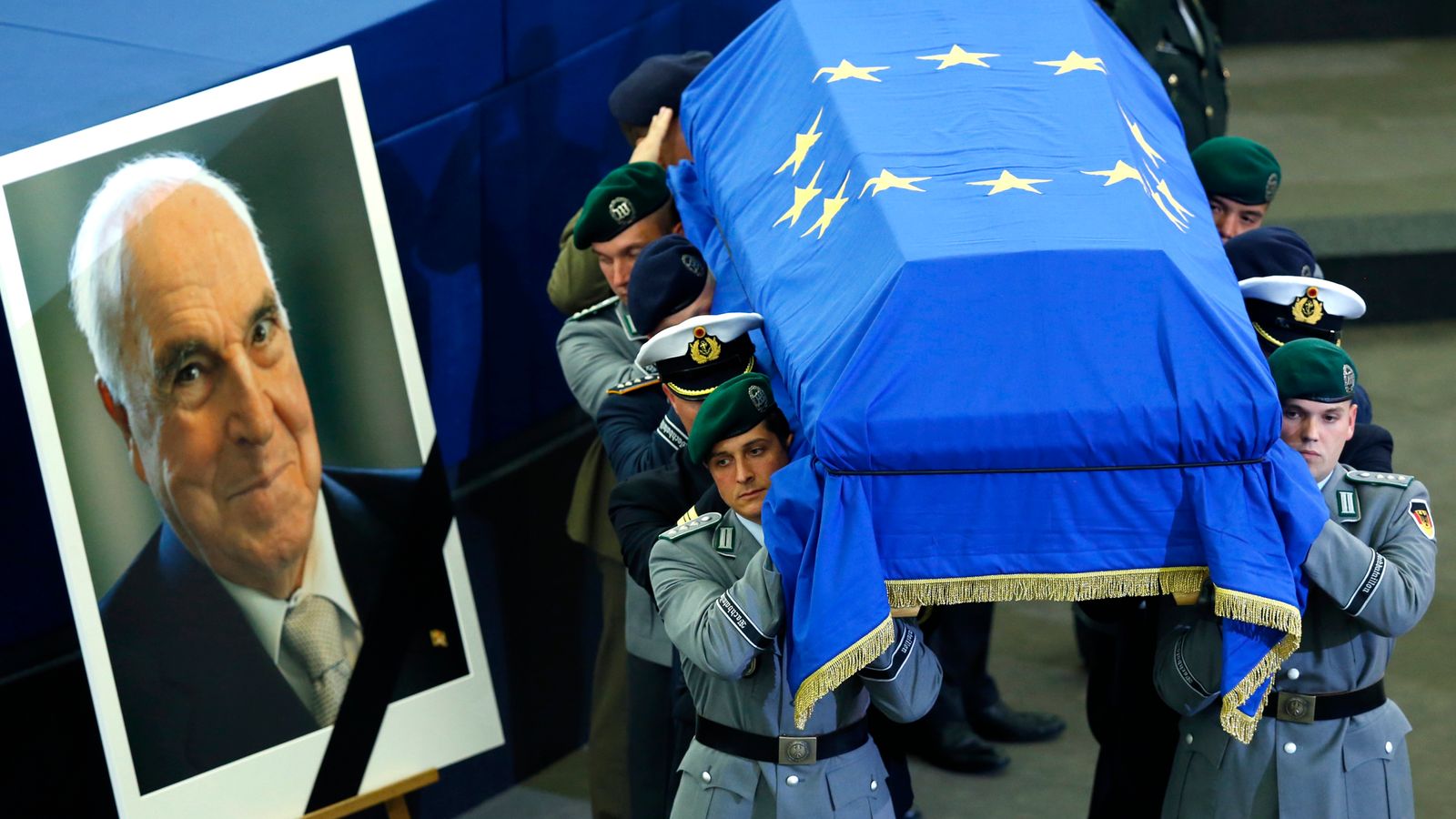 Helmut Kohl is considered one of the great architects of the European Union
Helmut Kohl is considered one of the great architects of the European Union